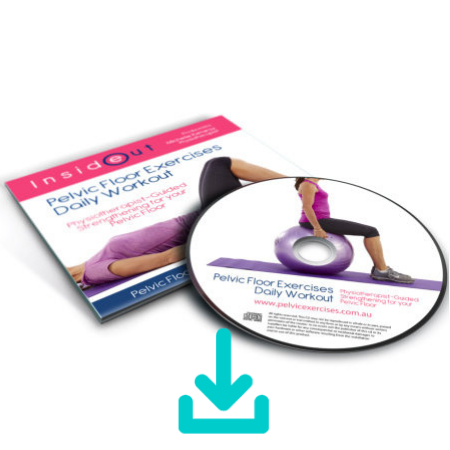 Pelvic Floor Exercises Workout
Pelvic Floor Exercises Workout
AUDIO CD OR DOWNLOAD NOW
Strengthen your pelvic floor with this daily Kegel exercises routine.
This evidence-based pelvic floor exercise workout guides you step by step.
Presented by:
Pelvic Floor Physiotherapist Michelle Kenway
Contents
Track 1 – Introduction to Successful Strengthening
Track 2 – Finding your Pelvic Floor
Track 3 – Feeling your Pelvic Floor Muscles
Track 4 – Using the Correct Pelvic Floor Exercise Technique
Track 5 – Beginners Pelvic Floor Exercises Workout
Track 6 – Intermediate Pelvic Floor Exercises Workout
Track 7 – Progressing and Maintaining your Strength
Part 1. Best Kegels Positions for Women
The best position for kegels for beginners is the one that you can feel that you’re contracting and relaxing your pelvic floor muscles.
The best kegel positions for effective pelvic floor strengthening include1 :
- Lying prone on your tummy
- Lying on your back with both knees bent and feet flat
- Sitting on a chair, stool or exercise ball
- Standing upright
It’s very important to do your pelvic floor exercises (Kegels) keeping the normal inward (neutral) curve in your lower back throughout. Your ability to do strong pelvic floor exercises is lessened when the curve of the lower back is flattened during your exercises2.
Part 2. Kegel Exercises for Women Step by Step
Your pelvic floor muscles sit in layers between in and around the area where you sit. These muscles sit wrap around the 3 openings in the female pelvic floor.

There are 4 steps involved in doing your kegel exercises correctly.
Step 1.
The first step involves tightening the anus as if stopping gas from passing. Your buttocks should stay relaxed when your anus tightens.Tighten your anus and lift inwards to feel an inward squeezing sensation inside and around your anus.
Step 2.
Tighten and squeeze the entrance to the vagina as if you’re closing it shut and lift your vagina inwards at the same time. Imagine a string drawing your vagina up inside your body, as if to resist withdrawing a tampon.
Step 3.
Tighten the opening where the urine comes out (urethra). You may feel your anus and vagina tightening too and this is the correct action to feel.
Step 4.
Now relax your pelvic floor muscles back to resting position and rest to recover.
Correct Kegel Exercise Technique
Combine the actions outlined in the Kegel Exercises for Women video for doing the correct pelvic floor exercise technique.3
- Start sitting tall
- Breathe normally throughout your exercises
- Combine steps 1-3 into one action: tighten and lift your anus and vagina inwards AND and squeeze your urethra as if you’re stopping the flow of urine
- Relax your pelvic floor muscles back to relaxed starting position
- Rest for 10 seconds before attempting your next exercise
If you’re unsure about your technique, there are a number of Physical Therapy strategies that you can use to feel your kegel exercises.
How Many Kegels for Beginners?
Start out doing 1-2 doing gentle kegel exercises in a row and focus on using the correct Kegel technique.
As your technique improves you can progress by doing a few more kegels and start to maintain (hold) your muscles contracted for longer.
For example, if you can do 2 kegels in a row and maintain each exercise for 3 seconds, this is what you should start with. Do 2 kegel exercises in a row and maintain each exercise for 3 seconds. Take a break of up to 10 seconds to fully recover after every exercise.
Try to repeat this exercise routine 3 times a day.
Kegels Exercise Training Program
When you’re strengthening your pelvic floor muscles, it’s important to get the right training dose. This involves doing the correct number of exercises.
If you’re a beginner, progress the number of kegels you practice as your pelvic floor muscle fitness improves.
Aim to do:
- 8 -12 kegel exercises
- Up to 10 seconds/exercise
- Rest for 6-10 seconds
- Repeat 3 times/day
- Most days of the week 4:
How to Test Your Kegels
There are a number of ways you can test whether or not you’re doing your kegel exercises correctly.
This includes:
1. Stopping or slowing the flow of urine once it’s started. Use this as a test and not an exercise (once/week maximum).
2. Tighten your pelvic floor as if to stop passing gas.
How Long for Kegels Results?
The time for results from Kegels training varies and there’s no set time course for predicting the speed of pelvic floor muscle rehabilitation.
Some women notice improvements in their ability to contract their pelvic floor muscles within a couple of weeks of starting their kegel exercises.
Others notice relief from symptoms of pelvic floor problems such as bladder leakage or bulging and heaviness in the vagina within the first month of starting their exercises.
Patience and persistence are important features of kegels training since it can take more than 5 months to show an effect related to pelvic floor muscle training4.
References:
1. Bo K. Talseth T. & Holme I. (1999) Single blind, randomised controlled trial of pelvic floor exercises, electrical stimulation, vaginal cones, and no treatment in management of genuine stress incontinence in women. BMJ, 318(7182), 487–493. https://doi.org/10.1136/bmj.318.7182.487
2. Sapsford R. et al (2007) Pelvic Floor Muscle Activity in Different Sitting Postures in Continent and Incontinent Women. Archives of Physical Medicine and Rehabilitation, Volume 89, Issue 9, pps 1741-1747. https://doi.org/10.1016/j.apmr.2008.01.029
3. Bo K. and Morkved S. Pelvic floor and exercise science (2015) In Bo, K et al (Eds), Evidence-Based Physical Therapy for the Pelvic Floor (Second Edition) pps 111-130 Churchill Livingstone.
4. Bo K. and Aschehoug A. Pelvic floor and exercise science (2015) In Bo, K et al (Eds), Evidence-Based Physical Therapy for the Pelvic Floor (Second Edition) pps 111-130 Churchill Livingstone.






